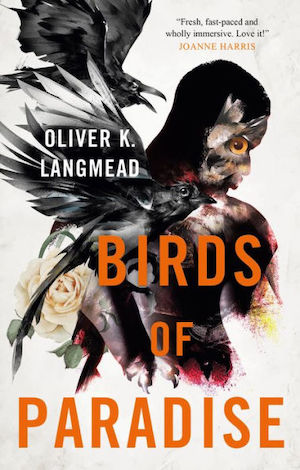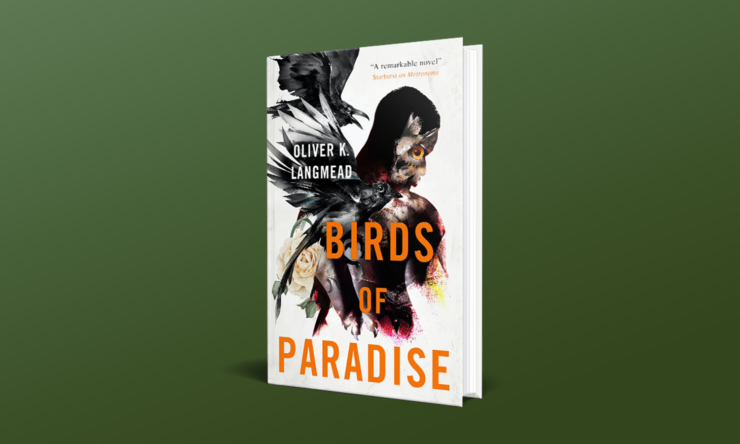Birds of Paradise has two books wrestling within it. One is completely successful, while the other has moments of brilliance, but also a few more problems. Oliver K. Langmead has written a swooping, poetic novel that meditates on ecology and human’s responsibility to our home, that is also, at times, a bumpy road novel. Birds of Paradise gives us breathtaking passages about love, and heartfelt descriptions of natural beauty, and wraps them up in a battle between nigh-immortal beings, and grasping, grubby humans.
But before we get into the book’s larger philosophical concerns, have some plot: Adam, the First Man, has been living a series of lives as immortals must: he lives as an adult, working a job, until it become weird that he doesn’t age. Then he moves on to the next town, or continent. He has walked most of the Earth by the time we meet him. In this latest life he uses his unusual bulk and strength to work as. celebrity bodyguard until he runs into some legal trouble, and has to be helped by an old friend: Rook, one of the original birds of Eden.
But Rook asks a favor in return. He needs Adam to accompany his sister Crow to Scotland, because somebody needs to figure out why their brother Magpie is spending so much money. Thus begins a picaresque fantasy novel as Adam crisscrosses the U.S. and the UK running into members of the Edenic First Family, including Rook, Crow, Owl, and Pig. These creatures can shift between human forms and animal, living life after life as humans, staging mock funerals for themselves and building capital, or they can embrace their animal forms and leave civilization.
And of course, there’s another thing to be mentioned. Created before anything like a Fall, they are larger than their descendants, stronger… somehow more. And, created before death, they are vibrant and alive in a way that true mortals are not, as though they exist in an extra dimension. Now, that doesn’t mean they can’t die—it just means that it takes considerable effort to kill them. It also attracts unwanted attention from the jealous children of Adam and Eve.
Buy the Book


Birds of Paradise
Over time the book’s actual narrative becomes clearer. It seems that the plants of Eden, just as vibrant and long-lived as the beasts, are popping up in unexpected places. A market in the Alps sells peaches that are in season all year. An improbable rose grows in a desert. A bustling flower market has an orchid that is impossible to kill—and you know you’re in a fantasy story when orchids are low maintenance. But it seems that at least a few people have started noticing that magical creatures and plants live among us, and as you might expect, the Children of Adam don’t always allow their fore-parents to live in peace:
It took Adam lifetimes to find all the pieces of Eden’s Tiger. When they took her apart, they made her coat into a banner, and then a cloak. Her teeth they used for tools, making axes and saws, and then pieces of jewellery, necklaces and earrings. Her whiskers they made into a harp, winding them around lengths of strong cedar, the sad noises a mockery of her living voice. Her bones they whittled into idols and knives, things to worship and things to murder with. Her claws they kept as trophies. Look how fierce the thing we killed was. Look at us, such mighty men. By the time Adam had gathered as much as he could, the original hunters had all died of disease or old age, so he killed their children instead. The gathered remains, he buried in Siberia.
There is a giant overarching argument animating the book. A big ‘un. It hinges on a quote from Genesis, 1:28: And God blessed them, and God said unto them, Be fruitful, and multiply, and replenish the earth, and subdue it: and have dominion over the fish of the sea, and over the fowl of the air, and over every living thing that moveth upon the earth. Do humans have dominion over the Earth? Are we owed a place near the top of the Great Chain of Being? Or are we part of a larger web or nest or net or however you want to put it—interconnected and dependent upon each other for life?
At the heart of Birds of Paradise is an argument between these two questions. One faction believes that all life is connected. Humans are not special at all, and, honestly, fall a bit below other animals—and way below plants—in The Great Ranking List Post of Life. The other faction believes that humans have the right, or even the responsibility, to dominate all of nature, bend it to their will, and assert their superiority over flora, fowl, and fauna, as the greatest way to honor God.
I found the more poetic moments the strongest in the book. Any time Adam muses on his long life, or meditates on his time in Eden, the book positively sings. I mentioned The Fall before, but there’s no real sense that it unfolded as Genesis would have us believe—instead Genesis seems to be one of many retellings of Adam’s life. Eden’s people, animals, and plants are scattered across the Earth at random, and if they were kicked out, Adam can’t remember it. If life is meant to be a punishment, he can’t remember committing any crime. He just travels from place to place, tending gardens and planting seeds. Best of all is the way that Adam sees through eyes that are more comfortable in nature, constantly checking in with plants and birds no matter how deep he has to travel into the city:
St Pancras Station is different than Adam remembers. It’s just as cavernous as it’s always been, but the echo has changed. So many people create such a clamour of feet and voices, intermingling with the announcements and noise of all the trains, that he’s not as able to hear the pigeons. Worse, when he studies the high rafters, he notices that spikes have been installed to prevent any birds from roosting. Gradually, Adam makes his way through the station’s labyrinthine layout, searching for the train he needs and searching for stray feathers on the floor.
It’s also fascinating to watch Adam crash into history, as he recounts stints in World War I, Ancient Egypt, and, my personal favorite, modern London during Pride Month:
There are double-decker buses crammed full, bedecked with rainbow flags and blasting noisy, tinny beats at the streets, and there are fabulous, bright marching bands with mismatched outfits playing music to wholly different rhythms, and there’s even a float with a grand piano attached to the back, being played by two different people simultaneously, creating a catastrophe of competing noises. Everybody is dressed in bright colours, and there is an abundance of glitter, as if bare patches of skin are real estate that needs to be occupied by shimmering colours. Cannons shower glimmering rain over the thickest patches of people, and everybody seems to be dancing. In the buses they shuffle their shoulders, and on the road they twirl and laugh, and nobody is judging anyone for the quality of their moves; Adam watches a girl in a wheelchair whirling about on two wheels.
While I think fans of mythological fantasy like a lot of Neil Gaiman’s work will enjoy Birds of Paradise, it does have some flaws. My main issue with the book is in the way the fantastical element chafes against realism, and reality is handwaved a little too much. The flora and fauna of Eden are stronger than regular mortals, but they don’t exactly have magical powers. They’ve had centuries to amass wealth, but they’re still ultimately subject to the law. However, there are multiple points in the book where they get through airport security lines and public disturbances that definitely would have attracted attention from the police. One of the big comparisons I’ve seen for Birds of Paradise is American Gods, and I think it’s apt, but Gaiman is very good at showing the joints and seams when a god or monster has to navigate life in the 20th or 21st Century. Here I felt like the characters were a bit more “in the world but not of it”, and I think the book would have been stronger if it had shown more of the clash. And having said all that, there is some intense violence in this book, usually when the Edenic denizens run into regular folk. Personally, I think it’s all justified and adds to the book, but I also think it’s a good idea to throw out a warning for readers who might want to tread cautiously.
I mentioned the issues at the top of the review, and I think what sums it up is that the poetic parts of the book are extremely successful and fresh, but are interrupted by burst of plot that don’t flow quite as organically as Adam’s observations on life. Langmead’s previous work includes a book-length noir poem, Dark Star (which got a shout in The Guardian‘s best of round-ups for 2015) and his writing really shines when he allows the book to be a kind of poetic philosophical text. The book stretches toward some fascinating ideas, and even if it doesn’t always quite reach them, it was exciting to think along with the First Man and his family.
Birds of Paradise is available from Titan Books.
After entirely too much thought, Leah Schnelbach has decided that given the choice to become an Edenic Bird they’re going with PUFFIN. Come squawk with them on Twitter!










